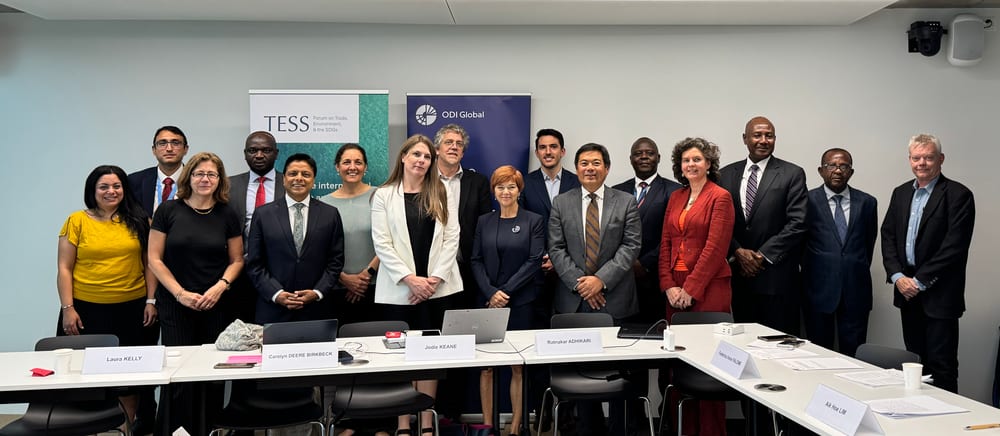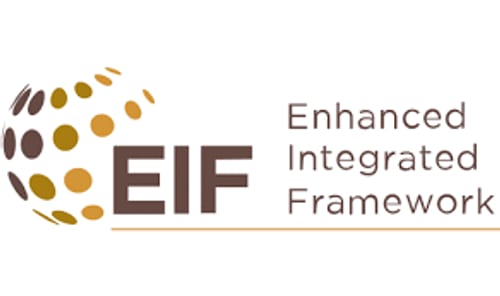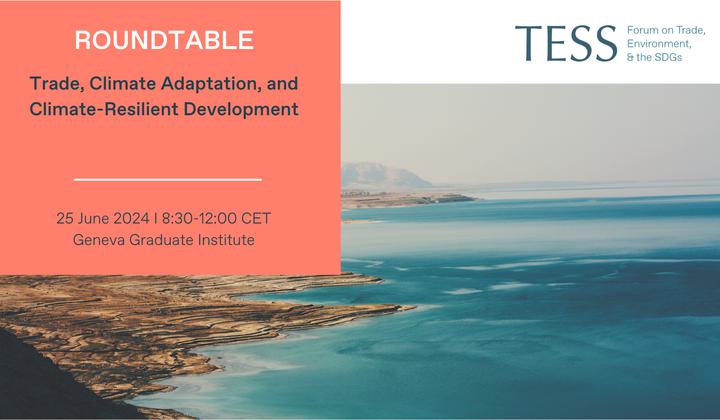This workshop dove into the key outcomes of COP29 in relation to climate finance and the broader drive to secure supplies of renewable energy. The global commitment to increase climate finance creates opportunities to align aid for trade with climate action to promote sustainable growth and to support LDCs in scaling up their share in global trade while addressing critical trade and environment-related challenges.
It also addressed the role of trade cooperation in promoting the co-development, diffusion, access, and transfer of technologies that are critical to enable LDCs' transition to low-carbon economies, as well as the global goal of climate change mitigation, which requires new green technologies.
This workshop is part of a series that will explore the intersection of climate priorities in relation to adaptation, loss and damage, and mitigation through a focus on different thematic issues at the nexus of trade and climate-resilient development for LDCs.

Agenda
Session I: Setting the Scene
This session set the scene by reviewing LDC-specific vulnerabilities to climate change and their priorities regarding natural disasters and economic resilience, climate change adaptation, access to energy, climate-resilient development, and a fair transition to a low-carbon economy.
It also reviewed possible trade-related policy tools that LDCs could pursue to address their environmental priorities and the role of international support measures such as finance, investment, technical assistance, capacity building, and technology transfer.
Speakers:
- H.E. Jean-Pierre Baptiste, Ambassador, Permanent Representative of Chad to the the United Nations Office and other international organizations in Geneva
- Dr. Debapriya Bhattacharya, Distinguished Fellow, Centre for Policy Dialogue (CPD)
- Dr. Jodie Keane, Senior Research Fellow, ODI Global and Laura Kelly, Director of Sustainable Markets, IIED
Session II: Leveraging Country Platform Approaches for Climate-Resilient Trade and Finance in LDCs
Several LDCs are harnessing country platforms to advance their efforts to attract, mobilize, and coordinate international public finance in support of common goals. While these vary in form, all are voluntary, government-led, multi-stakeholder partnerships. They are also considered a way to align international and national goals, to unlock further international, public, and private finance and investment.
In the area of climate change, many highly climate-vulnerable LDCs are embracing low-carbon development plans. For example, the Gambia has integrated trade, climate, and finance within new inter-ministerial structures; Zambia has pioneered a national green growth strategy that demands finance mobilisation and technology; Rwanda is integrating trade and climate through the Action on Climate and Trade initiative. Both Bangladesh and Cambodia have already engaged meaningfully with carbon markets (UNCTAD, 2024).
This session explored the framing of country platforms in relation to the climate-trade-finance nexus, examines learned lessons on country platform approaches in light of current financing needs and priorities, their effectiveness and potential for improvement, and discusses how aid for trade structures can be used to support country platform approaches to secure climate financing and wider financing for climate-resilient trade and development.
Scene-setting presentation: Permanent Secretary Alfred Okidi, Permanent Secretary in the Ministry of Water and Environment in Uganda/LIFE AR
Speakers:
- Dr Ratnakar Adhikari, Executive Director, Enhanced Integrated Framework (EIF)
- Stefan Csordas, Economic Affairs Officer, LDC Division, UN Trade and Development (UNCTAD)
- David Boland, Economics and Sustainable Finance Manager, Green Climate Fund
Moderator: Dr. Carolyn Deere Birkbeck, Executive Director, TESS
Session III: Addressing LDCs’ Technology Needs and Priorities for Climate-Resilient Development
Technology needs assessments (TNAs), conducted under the umbrella of the UNFCCC, are participatory processes to identify developing countries' technology needs for climate change adaptation and mitigation. This exercise entails the prioritisation of technologies, considering not only environmental benefits but also economic viability and alignment with broader climate and development goals.
This session explored the TNAs' linkages with NDCs, trade, and finance. It discusses the work that has been done to assess the technology needs of LDCs and the lessons to date, including the role of international support mechanisms such as the UN Technology Bank and the UNCTCN, as well as innovative cooperation with the different players within the private sector in supporting the co-development, diffusion, and uptake of technologies needed by LDCs to foster climate-resilient development. It will then also explore ongoing work in the context of the WTO on this topic, including in various committees and through Aid for Trade.
Scene setting presentation: Vicente Yu, Independent Expert
Speakers:
- Carlijn Nouwen, Founder, Climate Action Platform Africa Global Renewable Energy Alliance
- Federica Irene Falomi, UN Technology Bank
- Peter Oksen, Green Technology and Research Manager, World Intellectual Property Organization (WIPO)
- Discussant: Aik Hoe Lim, Director, Trade and Environment Division, World Trade Organization
Moderator: Dr. Chantal Line Carpentier, Head, Trade, Environment, Climate change, and Sustainable Development Branch, UNCTAD
Closing and Agenda-Setting Session
- Remarks by ODI, IIED and TESS
Background
While LDCs account for a negligible share of GHG emissions, they remain particularly vulnerable to the direct and indirect effects of climate change. Storms, sea surges, floods, prolonged heatwaves, and droughts affect the price, quality, and availability of essential goods and services as well as trade infrastructures. In sectors such as agriculture and fisheries, changes in temperature, precipitation, or the prevalence of pests and diseases affect yields, crop productivity, or natural resources endowments. At the same time, LDCs are increasingly confronted with a proliferation of new requirements on their export markets, ranging from carbon standards to border carbon adjustment or due diligence requirements.
In this context, a key priority for LDCs is to ensure that addressing environmental challenges does not leave them further marginalised in global trade. Support mechanisms such as the Enhanced Integrated Framework or the broader Aid for Trade (AfT) Initiative can play a critical role in fostering economic diversification, developing supply-side capacity, and meeting the growing array of standards needed to compete in global markets. They are also essential to enable LDCs to build climate-resilient production and trade-related infrastructure, strengthen disaster preparedness, reduce vulnerability to extreme weather, and promote national green industries that can serve local economies.
With the dust settled on the outcomes of COP29, the views are mixed regarding the agreed New Collective Quantified Goal (NCQG) and the operationalisation of Article 6 on carbon markets. Hailed as “the start of a new era for climate finance” by some, there remain concerns that the result is accompanied by weak commitments. In this context, emphasis is made on how crucial the mobilisation of other existing frameworks, such as aid for trade, can help channel additional resources to LDCs, and make up for some of their widening climate finance gap towards the best impact possible, and there is also ongoing interest in how to spur private sector investment and finance flows to LDCs.
As LDCs work to bolster their resilience to changing climate conditions and respond to losses associated with impacts of the climate crisis, countries are also seeking trade cooperation relevant to technology transfer. Effective technology transfer, including not only the flow of goods and services but also skills, know-how, and expertise, is key for LDCs to foster natural disaster resilience, climate adaptation, access to clean energy, and a fair transition to a low-carbon economy.
Recent submissions by the LDCs to the WTO reinforce these demands. Hence, in addition to focusing on recent developments within the realm of climate finance, this workshop will also explore the relationship between Technology Needs Assessments submitted within the UNFCCC, the inclusion of needs within NDCs, and interaction with Article 66.2 and the UN Technology Bank and United Nations Centre on Transnational Corporations.
Questions to be explored include:
- How can existing aid for trade structures be used to support country platform approaches to secure climate finance within LDCs?
- How can technology needs and priorities identified by LDCs best be operationalised and addressed? What role for the UN initiatives such as the UN Technology Bank, the UNCTCN, and how can work at the WTO and UNCTAD support? How together can they spur support and engagement from the private Sector?
- What are the implications for in-country trade and climate-related institutional arrangements in LDCs?
In collaboration with







